We offer practical explanations and tools that will streamline your work and provide clarity where confusion and overthinking may have taken over!
Why MOSAIC CPD?
We offer practical explanations and tools that will streamline your work and provide clarity where confusion and overthinking may have taken over!
Continuing Professional Development (CPD) Programmes provided by Mosaic are hugely popular. The secret to Mosaic CPD is its uncomplicated format, enabling educators to refresh and up-skill in specific areas of pedagogical practice.
We currently have a wide range of programmes to choose from and we update and add new programmes continually. Check out the range of programmes on offer at www.earlyedcpd.ie
A Unique Profile for Each Educator
The MOSAIC e-CPD platform is designed with the professional development of the individual educator in mind. Once you register to our platform, you have created a personal record profile to keep track of your CPD participation. This includes the dates you participated in individual programmes, a copy of your handouts and a copy of your certificate of participation. This means that if you move to a different early childhood setting, your CPD profile moves with you.
Mosaic programmes are underpinned by the principles and objectives of early childhood quality and regulatory frameworks – however, they are delivered in
an accessible, common-sense style that enables educators to make real and sustainable changes and improvements to everyday practice.
Practical and Transferrable Learning
In a climate where early childhood care and education is busy and continually changing, we believe that supporting and motivating management and educators to keep practice fresh is fundamental to the provision of positive experiences for staff and children.
A tried and tested Mosaic delivery model adopts a practical, jargon free approach with high levels of transferable learning to practice outcomes. In everyday terms, when time is precious and tasks are high, this is what Educators need from CPD!
Group Bookings
We can facilitate team bookings if you have a large staff team. Just email us at [email protected] and we will send you a group booking form. You can pay in one payment for all programmes via bank transfer yet each programme is individual for each staff member as we will process your order manually.
Just follow this simple process to access MOSAIC e-CPD..
Online CPD Programmes
Participation in in-service training (or professional development) is the most consistent predictor of
quality staff-child interactions, and also has direct links to child development and learning’ Quality
beyond Regulation, OECD 2018.
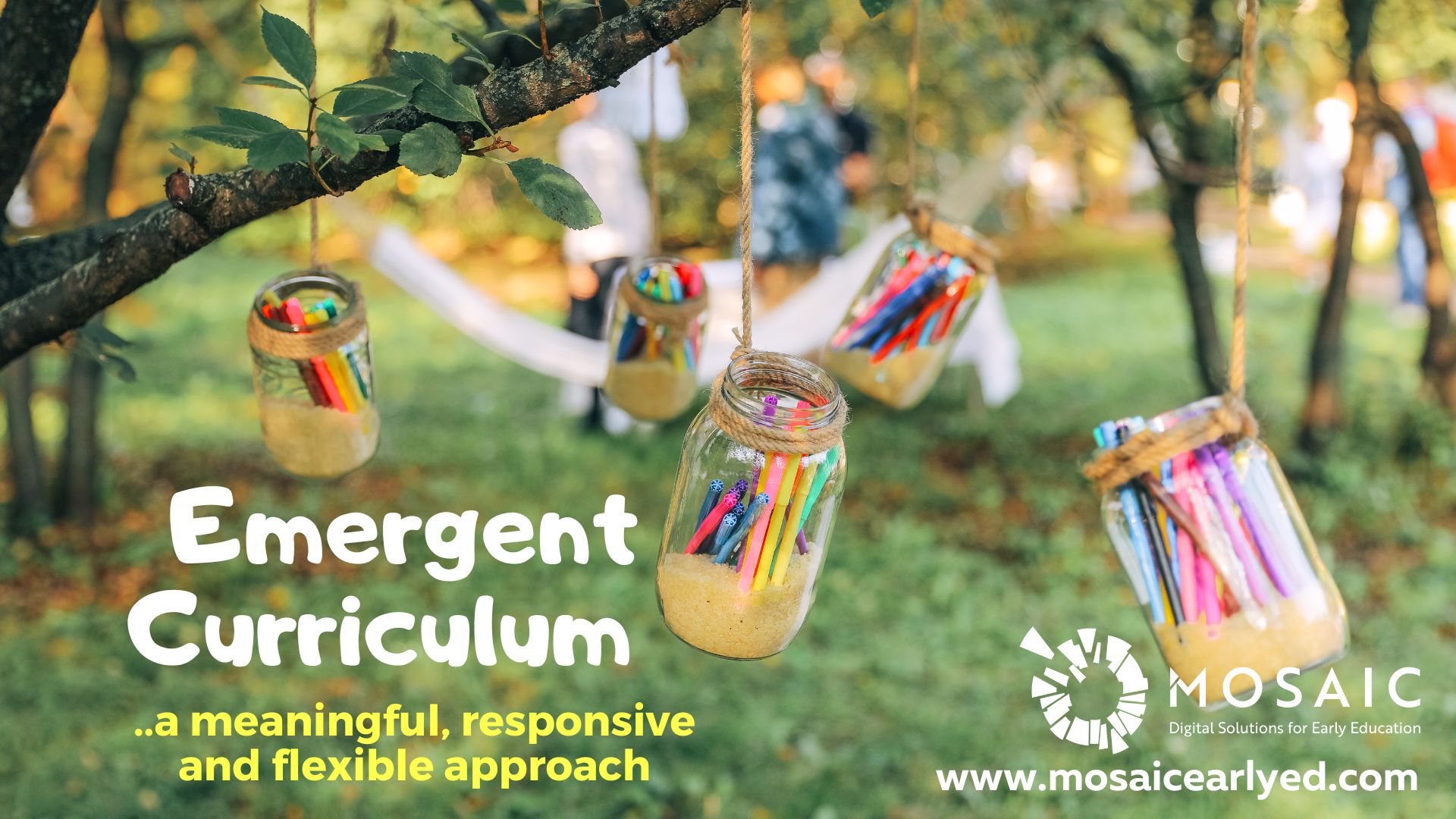
Emergent Curriculum
Emergent curriculum is a method of providing an early childhood curriculum that responds to children’s interests and needs as they develop naturally in real time.
The ‘Emergent Curriculum’ programme will enable educators to understand what emergent curriculum is and how to implement this pedagogical strategy when working with babies, toddlers and pre-school children.
This includes the background to emergent curriculum and planning child-led activities for the under 3’s and for pre-school children.

Strength-based Writing
The Strength-based Approach is a meaningful and real style of writing about a child in a way that comments on what they can do. It starts with where the child is now, not with what is absent, and highlights where the child can go with additional support.
The ‘Strength Based Writing’ programme will support educators to focus on professional writing techniques when compiling Learning Stories, Transition Reports or Snapshot Reviews. Practical examples of strength-based writing in different formats are included.
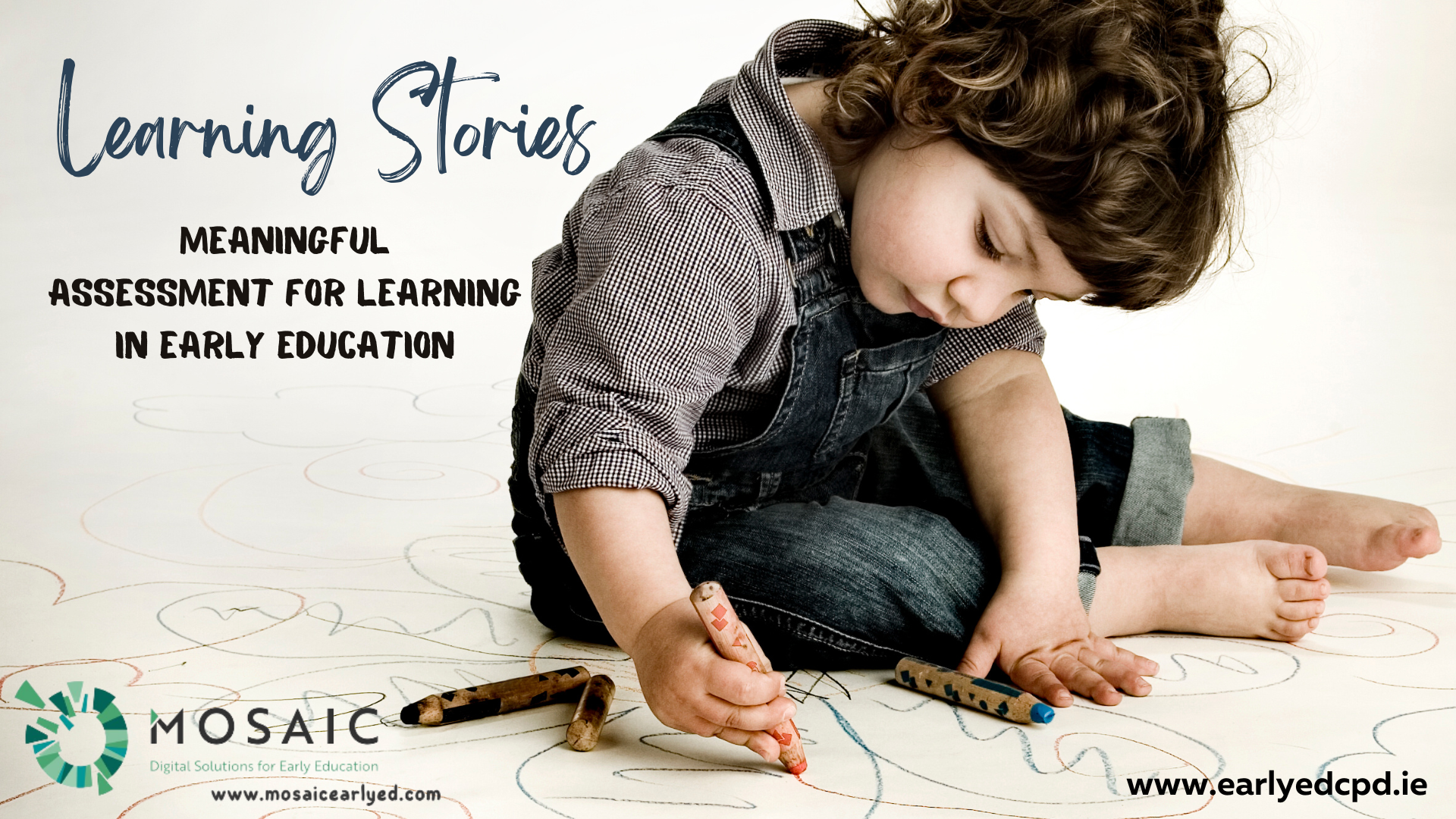
Learning Stories
Learning Stories are a meaningful method of
assessment for learning in early childhood that captures the uniqueness of the individual child and showcases individual strengths, interests and needs.
The ‘Learning Stories’ programme is packed with practical examples of learning stories and how to connect these to emergent planning.
Participants will discover how to structure, compile, and use learning stories as a meaningful assessment tool. They will learn practical writing and framing techniques as well as how to take children’s learning to the next level.
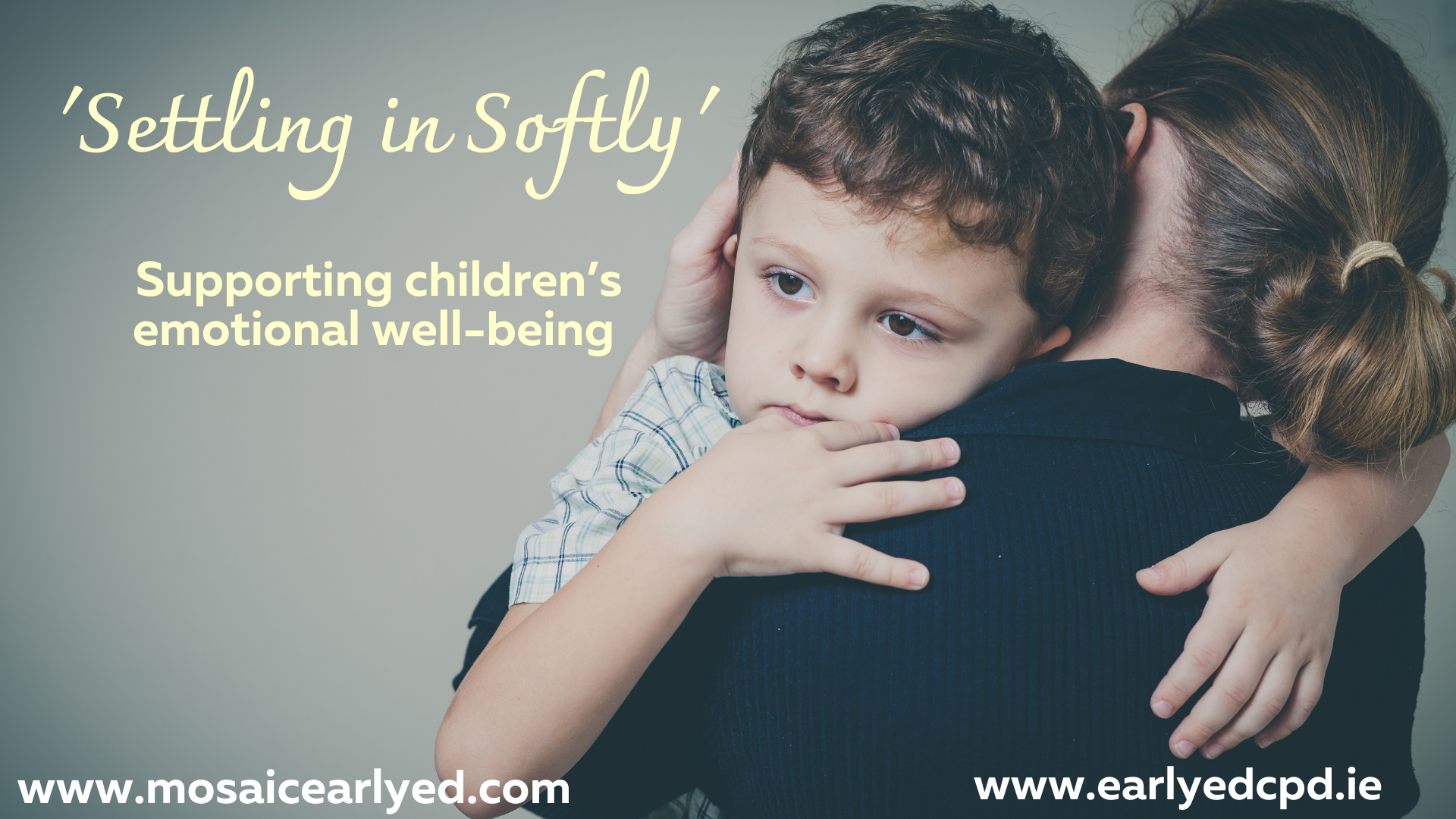
Settling in Softly
‘Settling in Softy’ will support Educators to focus on the important role of supporting children’s emotional well-being through a curriculum of care – for example, when joining the pre-school setting for the first time. This practical e-CPD programme is a must for all educators to ensure children’s emotional well-being is front and centre during the early months away from home and family. The interdependent nature of educator well-being and the ability to support children is also explored.
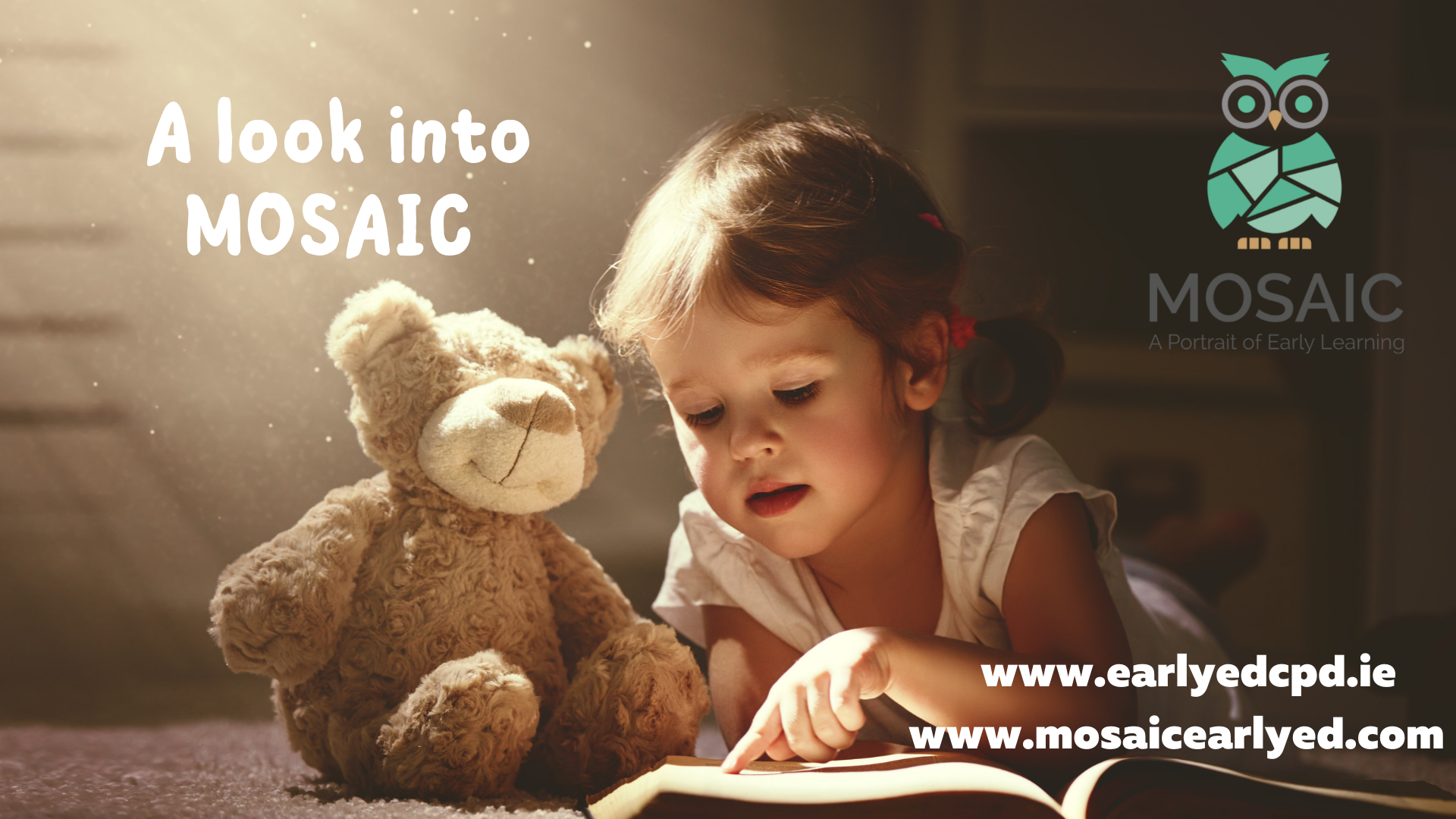
A Look Into Mosaic
‘MOSAIC Educator’ and ‘MOSAIC Family’ work together as a professional, child-led documentation system specifically designed for early childhood education.
The secure, child focused system is designed to dovetail with quality and regulatory compliance standards.
The Mosaic Platform includes learning story templates integrated with Aistear, emergent curriculum planning, transition reports, daily care logs for the under 3’s, attendance, safe sleep, group news, quality plan and much more.
‘A Look into MOSAIC’ will provide an overview of the key features of the MOSAIC Educator app. **Please note… this is not a training course, it is for information purposes only.
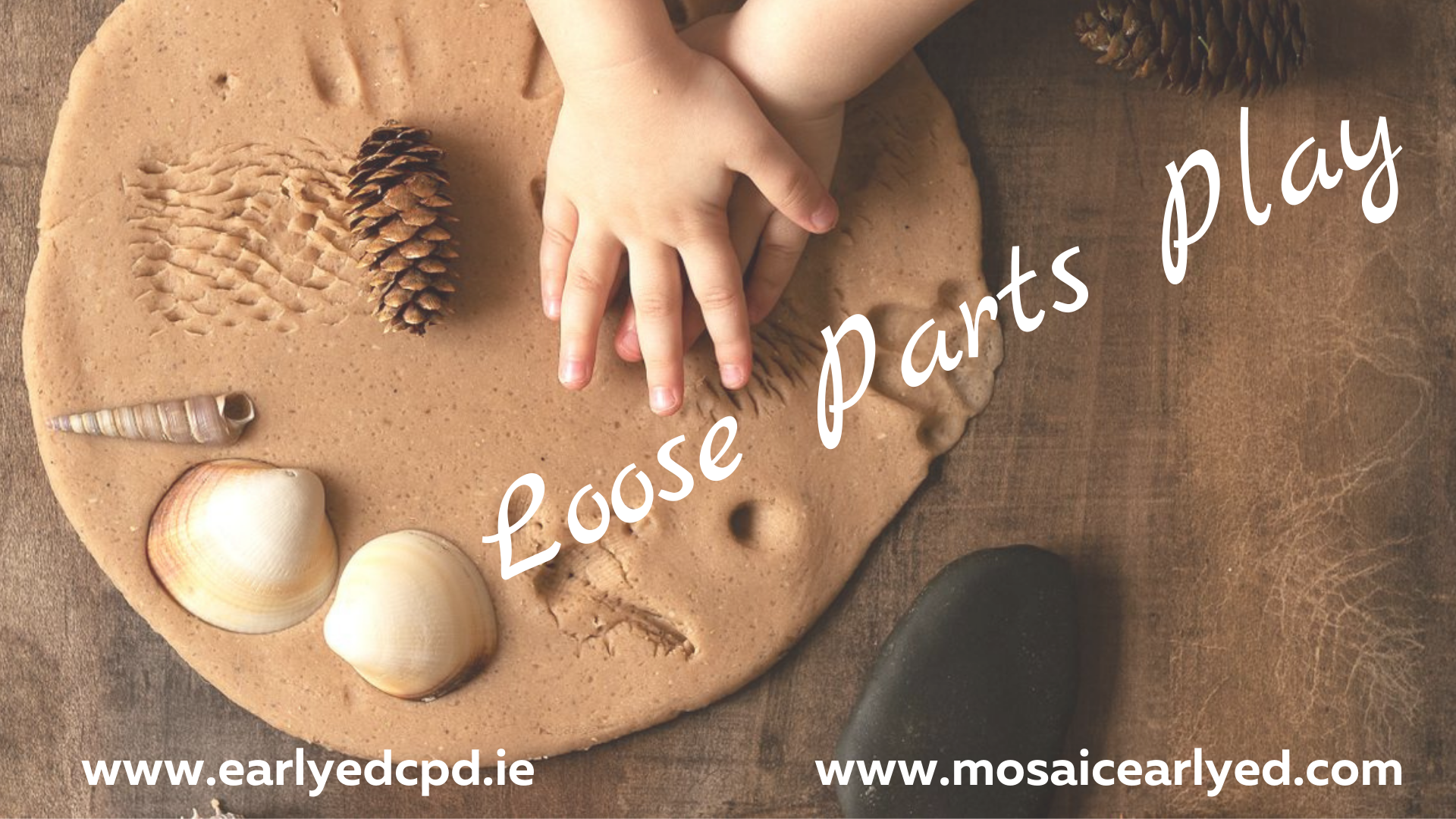
Loose Parts Play
Loose Parts are any open-ended materials that you can give to children that have no directions or instructions. With no prescribed method of play or end product, items can be used entirely at the discretion of the child. Loose parts play is a valuable contributor to an emergent, child-led curriculum approach.
The ‘Loose Parts Play’ programme contains lots of practical and visual inspiration to make loose parts play a significant component of an emergent curriculum for the under 3’s, preschool and school age children.
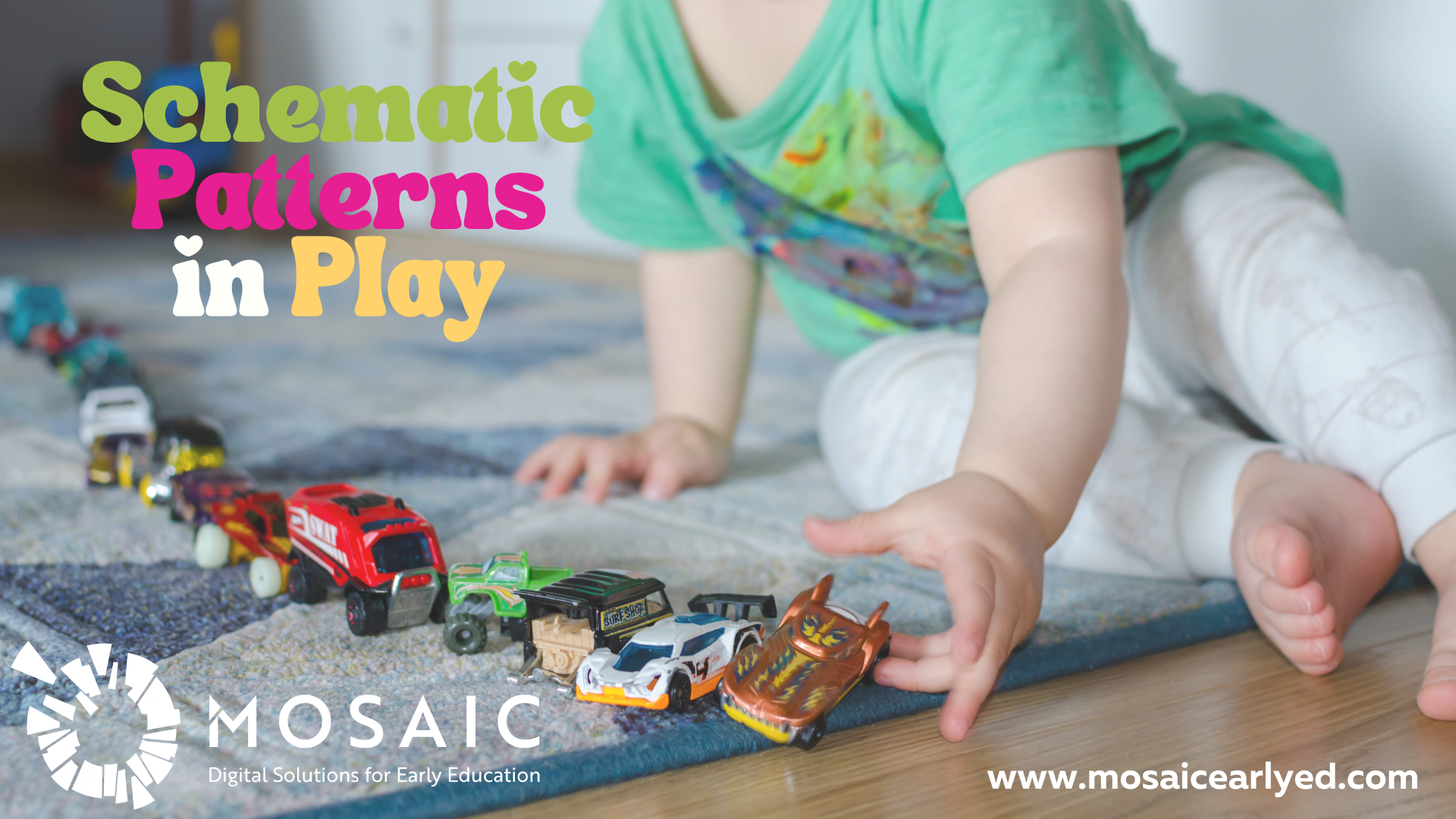
Schematic Patterns in Play
Schemas are patterns of repeated behaviour which allow children to explore and express developing ideas and thoughts through their play and exploration.
‘Schematic Patterns in Play’, identifies and explains 9 main play schemas. Sample activities to support children to develop these further are highlighted alongside descriptive words to build corresponding language acquisition under each schema.
Educators will also see examples of how to write a learning story with a schema focus and many images of play schemas in action. This programme is particularly suitable for those working with children under 3 and in junior pre-school.
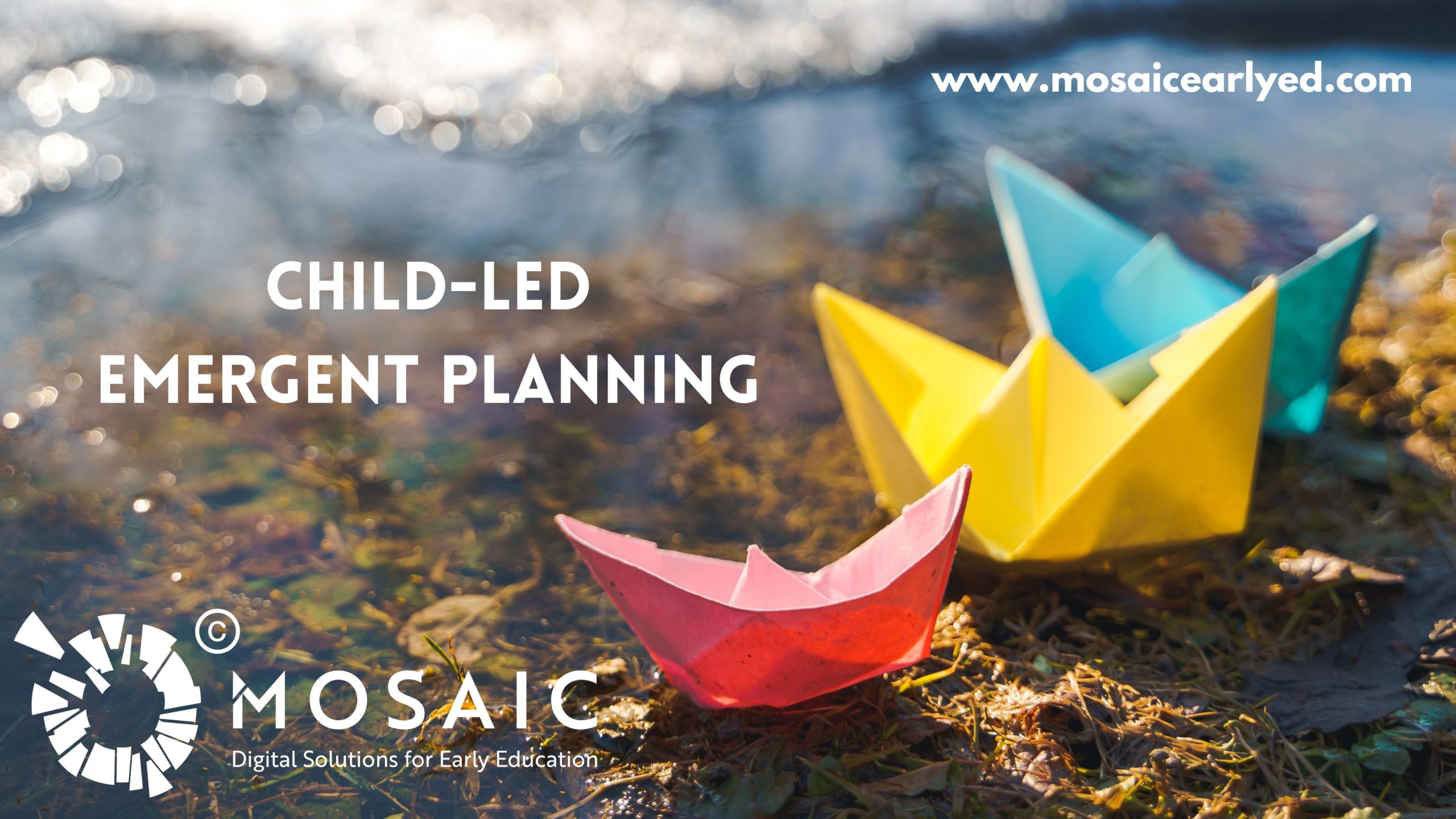
Child-led Emergent Planning
Planning curriculum from a child-led perspective is a method of planning that recognises and responds to children’s interests and needs as they develop. Plans are created as a result of child and educator input.
The ‘Child-led Emergent Planning’ programme is about creating a whole service streamlined documentation system. The aim is to provide the tools, examples and knowledge to implement a flexible, emergent approach to planning that includes children’s interests, preferences and needs.
This programme is an extension of the Mosaic CPD programmes ‘Emergent Curriculum’ and ‘Creating Learning Stories’ focusing on the planning component of the documentation cycle.

‘Seeing Voices’ Engaging Children’s Participation Rights & Voice in Early Education
The ‘Seeing Voices’ programme will give educators a sound framework from which to understand participation in the context of early childhood education and care. A range of practical strategies and activities for engaging children and including them in decision making processes in the early childhood setting are included.
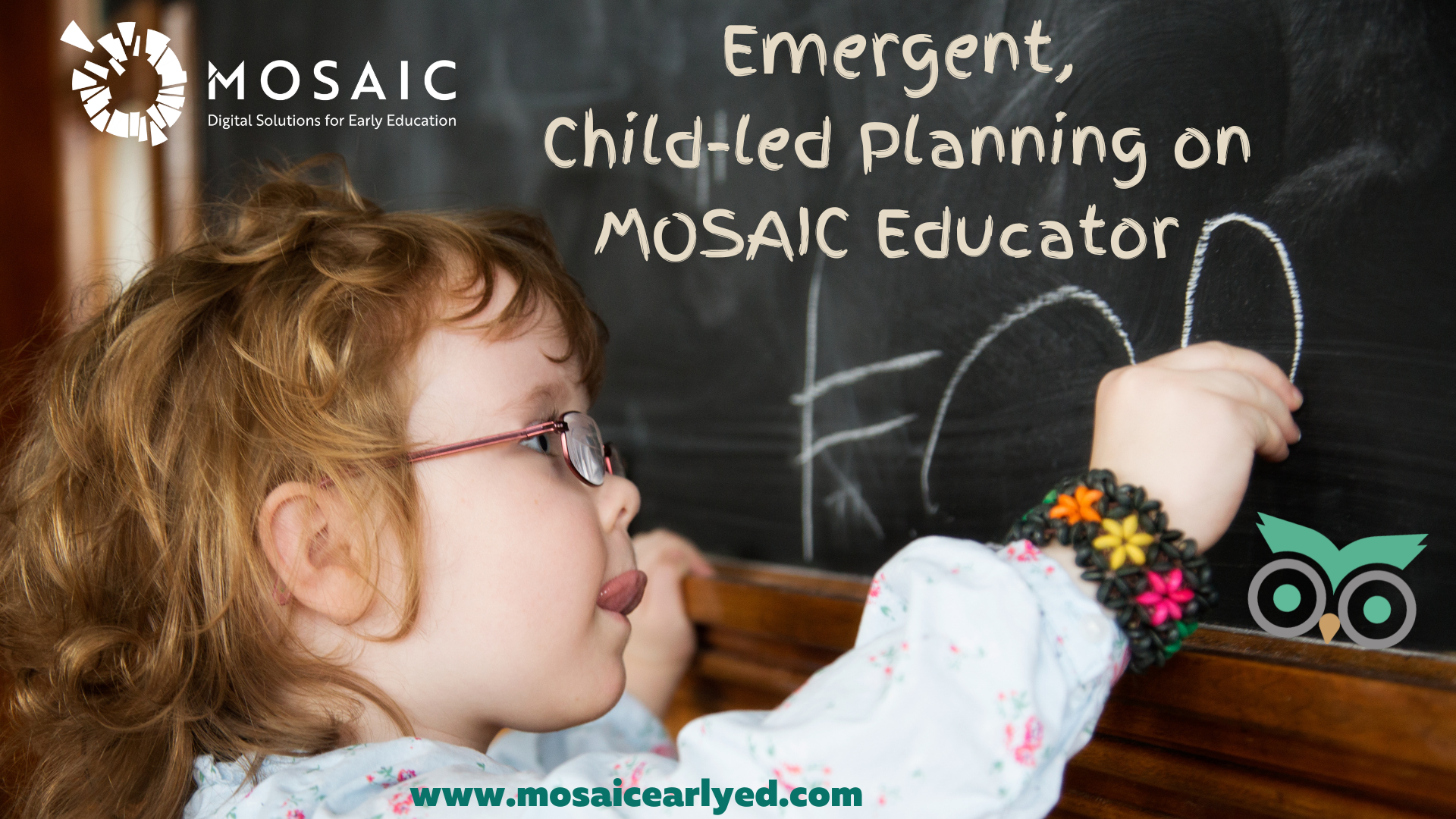
TribeMOSAIC Support Programme: EMERGENT PLANNING ON MOSAIC
This FREE PROGRAMME is for Educators using MOSAIC. The short presentation is aimed at providing MOSAIC users with a go to resource around the emergent planning system on MOSAIC Educator.
Firstly the presentation will explain how emergent planning sits within the MOSAIC Documentation System. Then guidance on actually completing an emergent plan using MOSAIC EDUCATOR is provided.
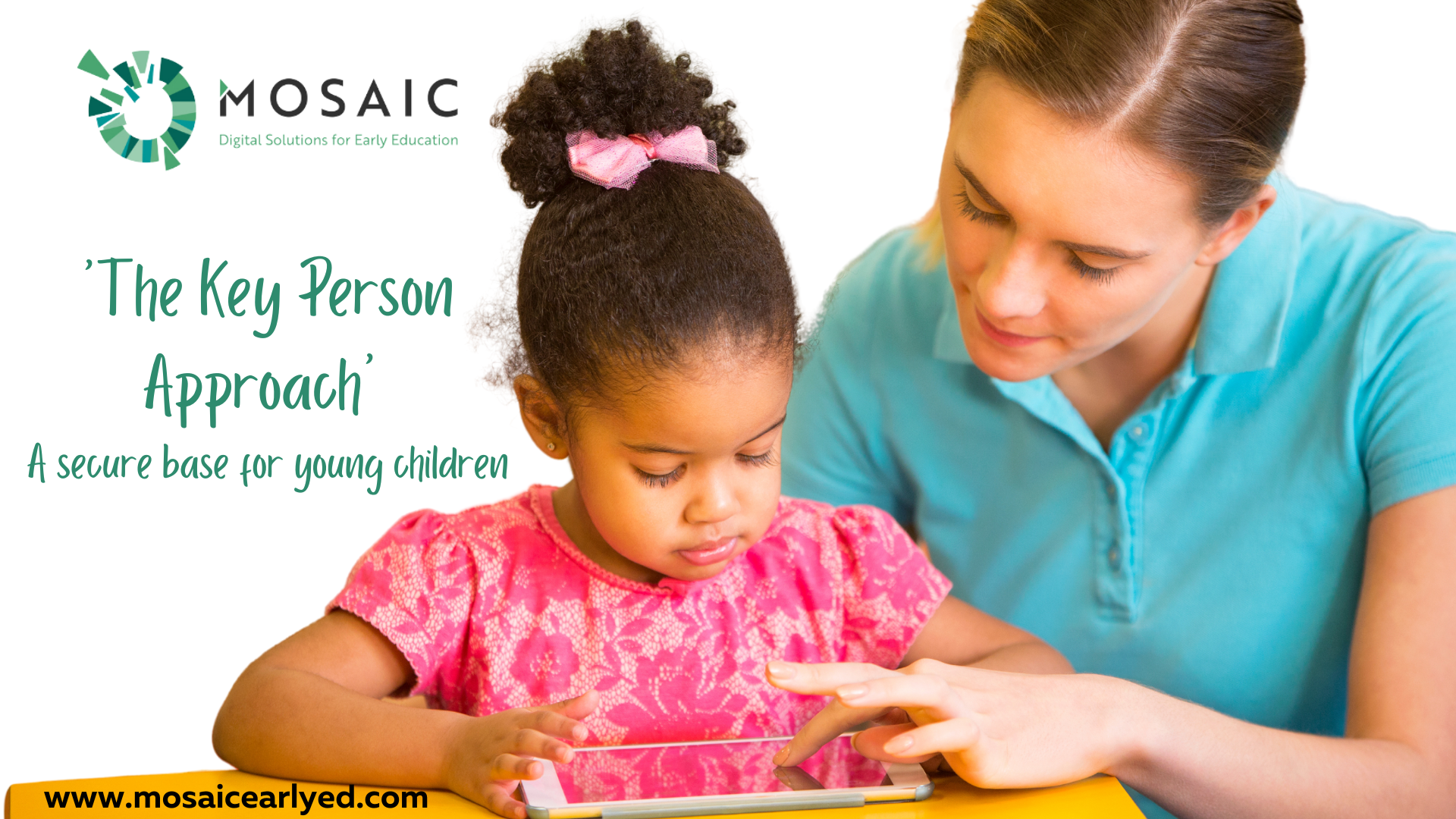
The Key Person Approach
The Key Person Approach is characterised by a relationship of trust so that the child can feel secure within a group experience. This approach is long recognised as a quality component of early childhood practice.
Whether you are a Manager of an early childhood setting who wants to implement a Key Person Approach or an Educator looking to refresh practice, this practical programme will keep you on the right track. The programme moves from the leglislative and quality context of the Key person Approach to the practical implementation of the approach itself.

Implementing Aistear 24
Aistear: the Early Childhood Curriculum Framework was first published by the National Council for Curriculum and Assessment (NCCA) in 2009. Aistear was the first curriculum framework for early childhood education in Ireland. It celebrates early childhood as a time of being, a time for enjoying and learning from experiences as they unfold, and laying important foundations for later learning and for life.
This programme ‘Implementing Aistear 2024 in everyday practice with babies, toddlers and young children’ consists of 6 components which can be undertaken in phases or all at once:
Component 1: The Aistear curriculum framework structure and components
Component 2: Guidance for good practice
Component 3: The Agentic Educator
Component 4: Aistear based emergent learning for babies and toddlers
Component 5: Aistear based emergent learning for young children
Component 6: MOSAIC supports and resources for Aistear implementation
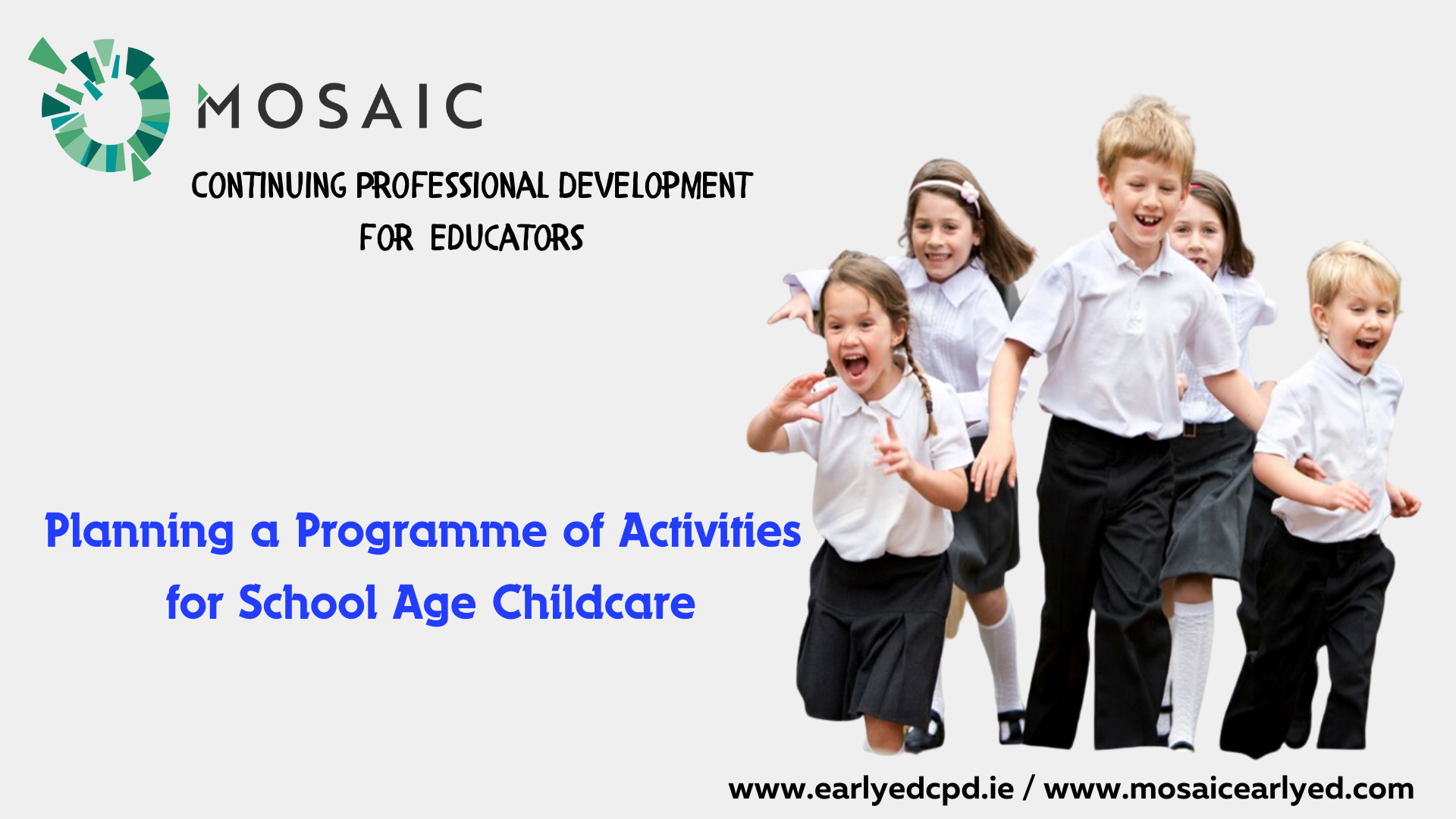
Planning a Programme of Activities for School Age Childcare
Do you want to adopt a simple format for weekly activity plans for School Age Childcare activities that meets the National Quality Guidelines for SAC?
What is included? Planning for SAC activities is distinct from planning for pre-school provision. This short programme highlights the importance of having a well-rounded programme of activities and demonstrates how to plot these on a weekly plan especially designed for school age provision.
*Sample plans, blank planning template, guideline and certificate of participation included for each participant.
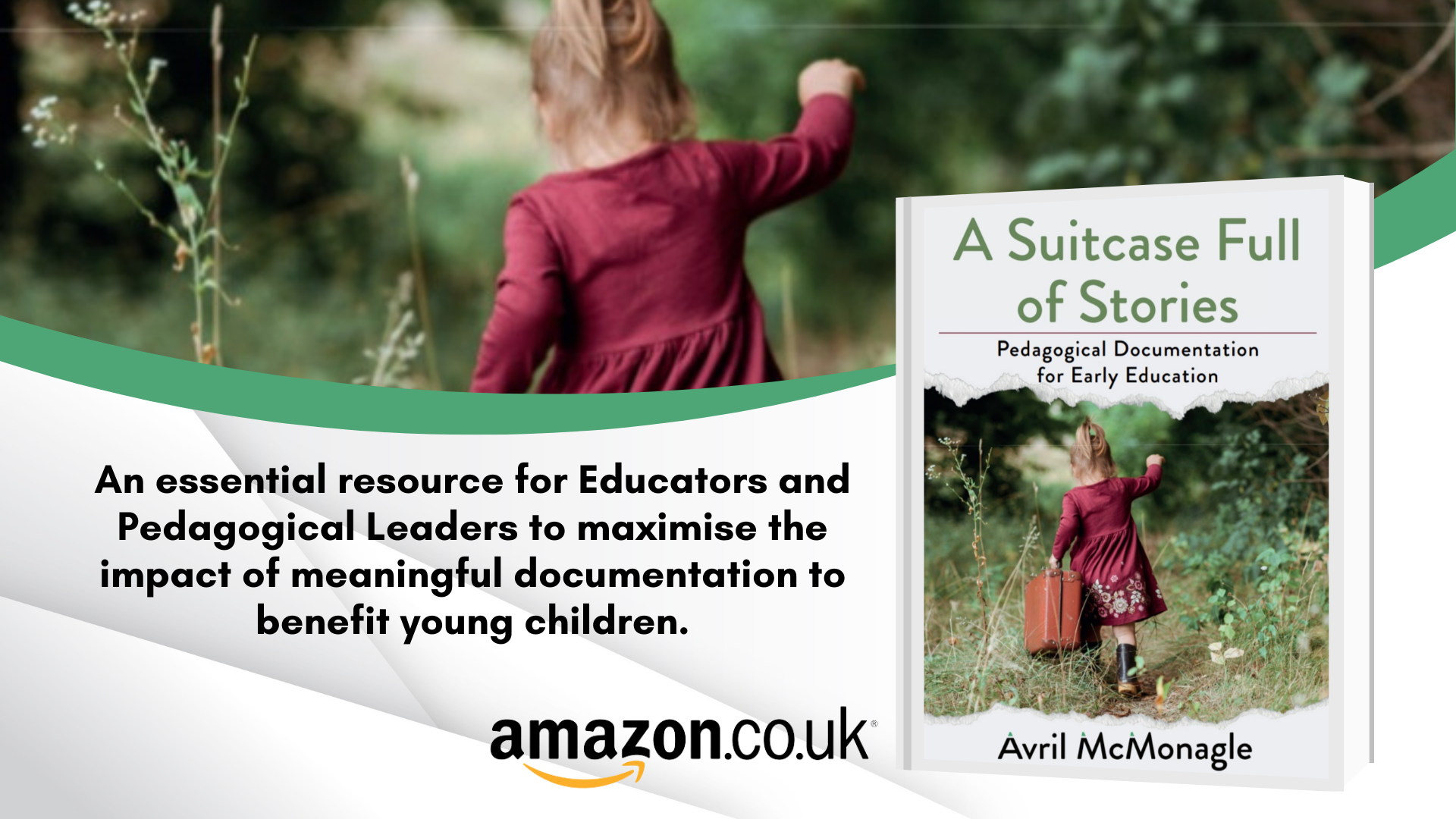
A Suitcase Full of Stories- Pedagogical Documentation for Early Education
‘A Suitcase Full of Stories’ is an essential resource for Educators and Pedagogical Leaders to maximise the impact of meaningful child-led documentation for learning using a story approach.
Packed with examples, this book is about capturing children’s stories. It supports educators to develop the skills to tune-in to young children, to see and hear their voice and to use this information to build meaningful learning experiences through a curriculum of play.
Available from Amazon.com
A short presentation will reveal the contents of each chapter.
What participants say about our Training Programmes…
The early childhood educator is central in enabling children to learn, develop and thrive in an environment where educators are motivated, enthusiastic and willing to embrace change. Continuing professional development opens up new ideas and challenges old ways of thinking and working.
Need advice on Online CPD Programmes?
Lorem ipsum dolor sit amet, consectetur adipiscing elit. Sed tempus pretium nibh in fringilla.
"*" indicates required fields

